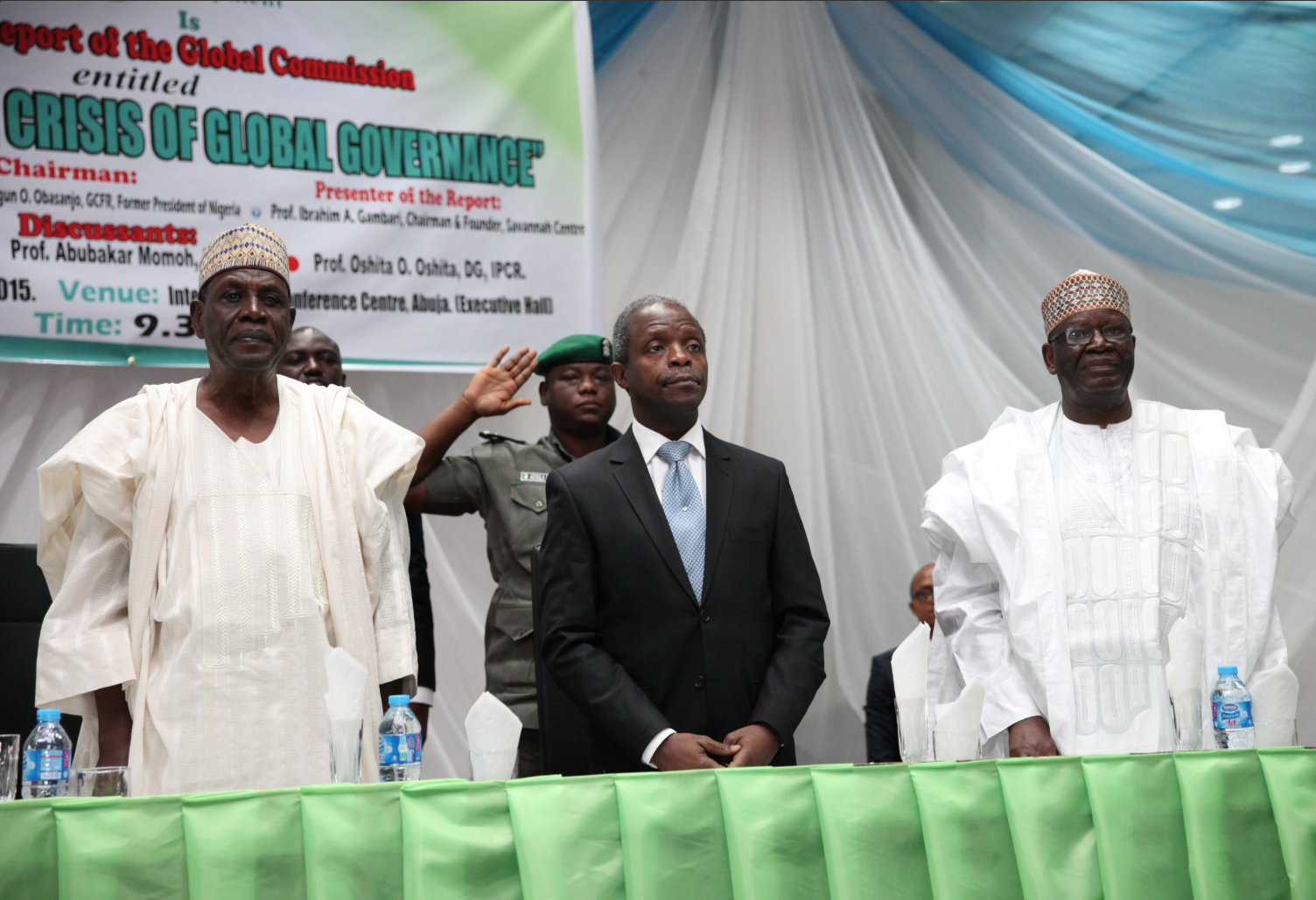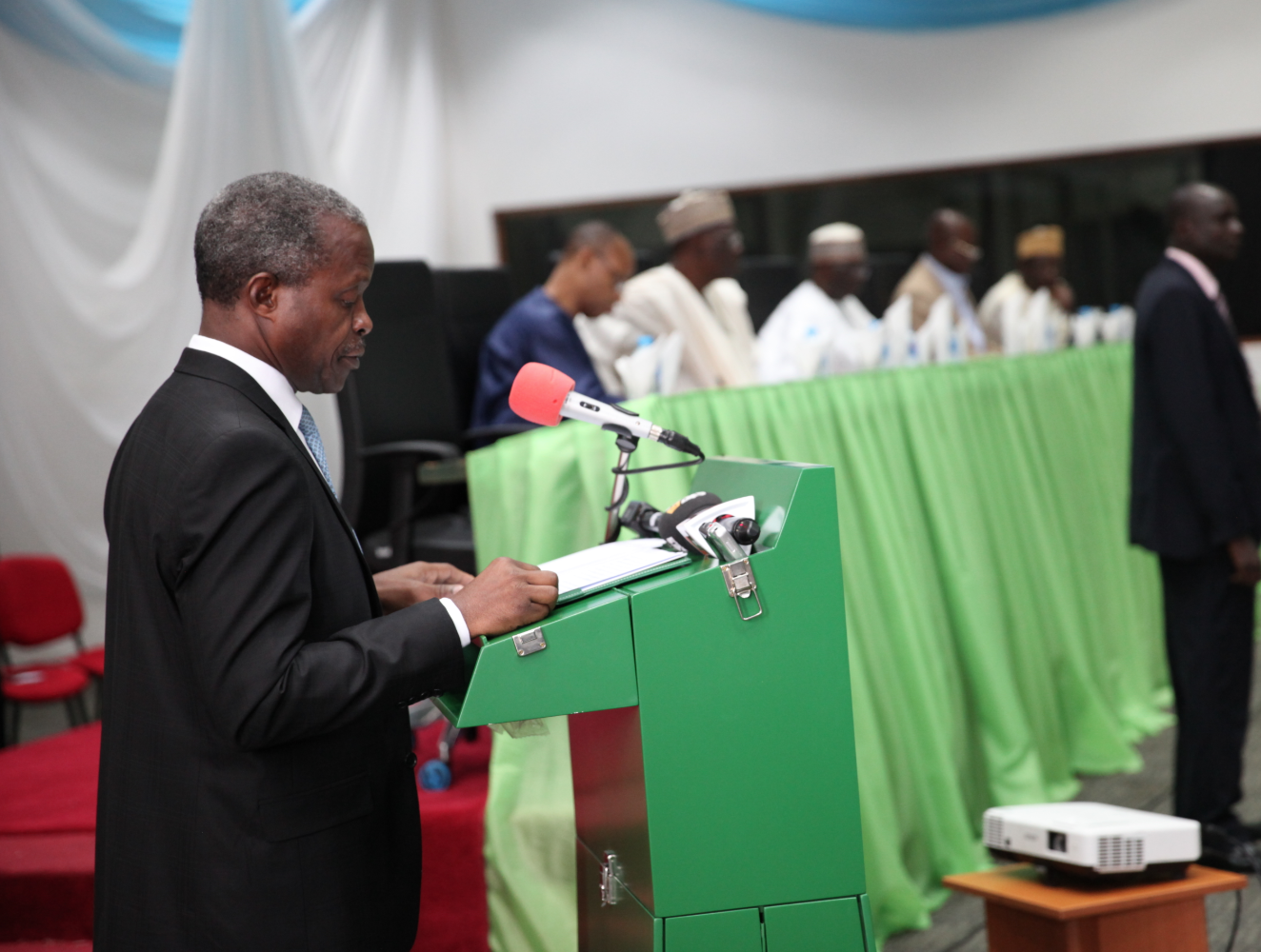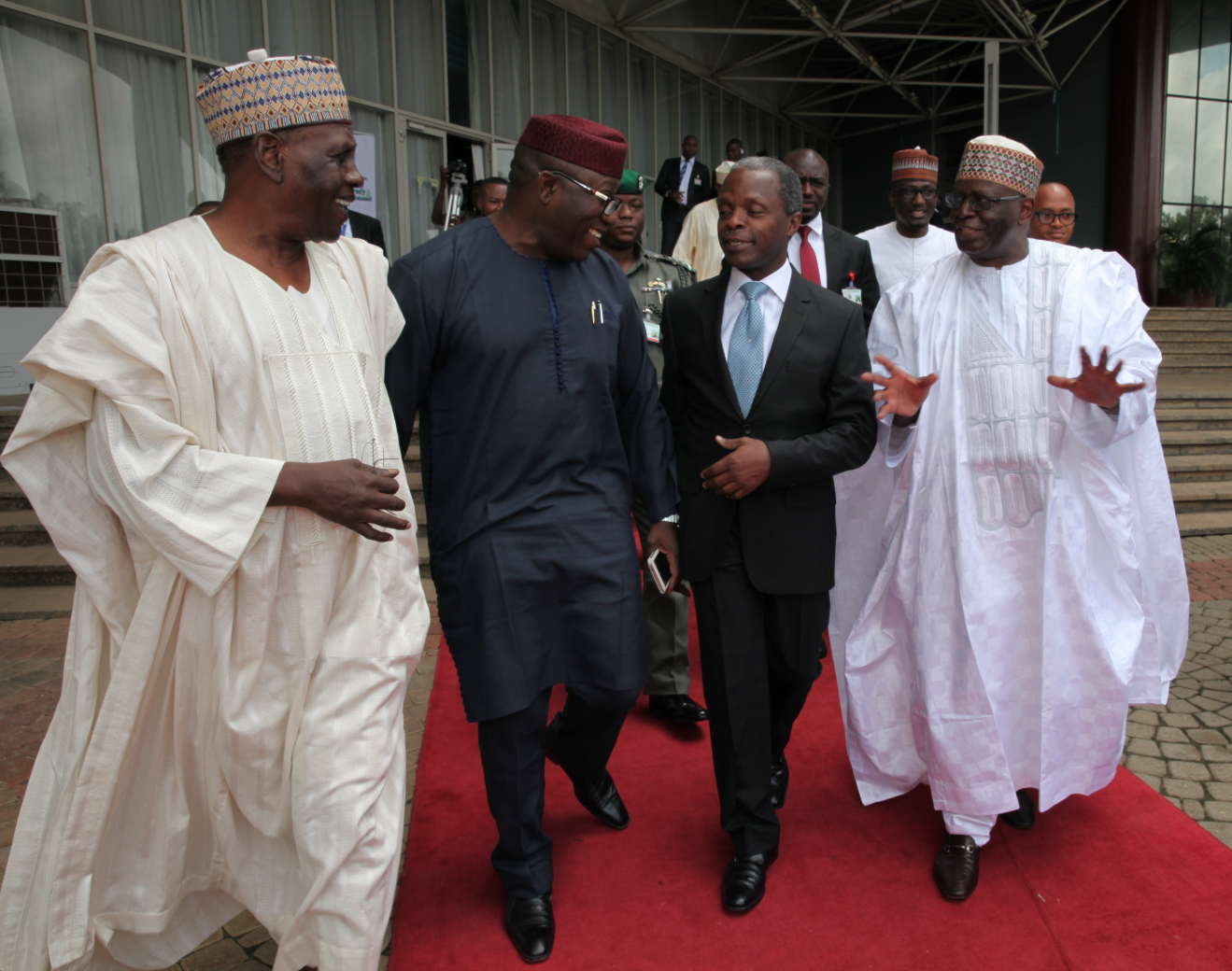Nigeria Launch Of Global Commission’s Report On Confronting Crisis Of Global Governance
KEYNOTE ADDRESS BY HIS EXCELLENCY, VICE PRESIDENT, PROFESSOR YEMI OSINBAJO, SAN, GCON FEDERAL REPUBLIC OF NIGERIA, ON THE OCCASION OF THE NIGERIA LAUNCH OF THE GLOBAL COMMISSION’S REPORT ON: CONFRONTING THE CRISIS OF GLOBAL GOVERNANCE AT THE INTERNATIONAL CONFERENCE CENTRE, ABUJA, NIGERIA, SEPTEMBER 9, 2015.
PROTOCOL
I am highly honored to be invited to deliver the keynote address at this very important and significant occasion. Reading the report on confronting the crisis on global governance, it is clear that most of the substantive issues are aligned with Nigeria’s long term interest and I can say on behalf of the President of the Federal Republic of Nigeria, President Muhammadu Buhari, and the Federal Government, that we particularly associated with the notion “that we live in a convergent era, growing global connectivity, in particular, that both enable forces of disorder and open new opportunities to tackle centuries old afflictions, such as global poverty, gender discrimination and the spread of disease”.
The report which the Hague Institute for Global Justice and the Stimson Centre of Washington jointly commissioned in August 2014, aims to assess the progress our world has made in the last five decades, and what needs to be collectively done to address, in a holistic manner, the issues of security with justice, and sustainable good governance. Good governance of course embraces inclusiveness, guarantees human rights of especially vulnerable groups and ultimately ensures a safer and prosperous world for us all.
We in Nigeria, are delighted that one of our own, the founder of Savannah Centre for Diplomacy, Democracy and Development, Professor Ibrahim A. Gambari, along with former U.S. Secretary of State, Madeleine Albright, co-chaired the production of this important report. (By the way, both of them are alumni of the Columbia University, and former Ambassadors of their respective countries to the United Nations.) The world owes you two a great deal of gratitude for your painstaking efforts. Nigeria and, indeed, Africa, equally appreciate the vision and commitment of the Hague Institute for Global Justice and the Washington-based Stimson Centre, for a peaceful and prosperous world built on Justice, Equity and Fairness.
As for Professor Gambari and the Savannah Centre, Nigeria certainly does not expect less and believes that the rest of Africa, would share our sentiments on this illustrious son of our country who has contributed so much for an enduring world peace where justice will be her bedrock. Savannah Centre’s entry into the NGOs space in Nigeria has added great value to the quality of both advocacies and research-oriented conferences in our country today. Through the launch ceremony, the role of Savannah Centre in drawing the attention of Nigeria and Africa to the work of this Commission and its report, deserves sincere commendation. The widespread impact of this report on our nations and peoples is certainly instrumental to the acceptance of the invitation by our respected former President, Chief Olusegun Obasanjo, GCFR, to Chair this impressive occasion. Although he had to go for yet another important international assignment this morning.
Mr. Chairman, distinguished Ladies and Gentlemen, there is no gain-saying that the crisis of global governance has deeply contributed to (and continues to) engender insecurity, injustice, corruption, insurgency, violent extremism, terrorism, piracy, climate change fears, cybercrimes and underdevelopment, amongst many other vices. Regrettably, Africa is one of the continents at the center of these crises. For instance, the report highlighted the issue of the inter section between justice and security, and this opens up the question of the place of Social Justice in ensuring security. There are those who believe that the absence of Social Justice in parts of our continent is partially responsible for the insecurity experienced in many of the countries in this content. The subtext is that African states must learn to treat our people not merely as statistics, but as human beings worthy of dignity and respect. And this can only be fully reflected in the provision by governments of social services and opportunities for their peoples. Of course, injustice in one states leads to instability or insecurity in neighboring states, even if only on account of the social economic consequences of the movement of refugees, ultimately no nation is free from the consequence of injustice anywhere.
Furthermore, Nigeria fully shares the views expressed in the report that the United Nations Security Council should be expanded, including the call in the report for restraint in the use of veto by the 5-permanent members. In addition, we take the position that based on our peacekeeping role in the UN, the size and strength of our economy and the fact that our country has the largest population on the continent, Nigeria should deserve permanent member status of the Security Council.
In consonance with our view, that peaceful settlement of disputes be encouraged and made more robust, we also agree with the report that the International Court of Justice or the World Court, should be strengthened and put to wider use, including expanding the acceptance of its jurisdiction and using its opinions creatively in the settlement of global dispute.
Regarding trans-border problems, Nigeria fully shares the view that no one State or group of States, can effectively deal with such challenges alone. For us as a nation and a Government, the issues of security, justice, human rights, climate change and sustainable good governance, constitute the cornerstones of the responsibilities that we owe our people. That explains why the Federal Government of Nigeria is meticulously reassessing the entire governance questions, with the hope of putting in place structures and institutions that can sustain Nigeria, in confronting the multitude of challenges identified in the report. The success of Nigeria in this endeavor would indeed impact positively, not only on other countries in our sub-region, but the rest of Africa.
Mr. Chairman, distinguished Ladies and Gentlemen, sustainable governance as a panacea to the challenges that confront our world today can only be successfully addressed by a determined visionary leadership, whose preoccupation will be to contribute to the happiness of the greatest numbers of our people. This natural democratic expectation is not a task for the political leadership alone. Important and, indeed, central to the success of governance as leadership is, every segment of the population, have critical roles to play to bring about the world of our dreams. I am particularly pleased to see in this audience, distinguished and accomplished personalities – inclusion of diplomats, captains of industry, politicians, women, military, the media and representatives of women groups. This clearly underscores the necessity for effective synergy by all of us, to steer our nations to sustainable growth and make our world a better and more secured place to live.
The issues of insecurity accentuated by violent extremism and insurgency, which Boko Haram represents, though initially a Nigerian phenomenon, have since assumed regional and international dimensions. Similarly, Climate Change, desertification, and the shrinking of the Lake Chad, are all socio-economic issues that affect the sub-region just as they impact on sub-regional security questions, necessitating efforts are made for collective and concerted responses.
I am happy to note the significant progress being made in this direction through the revitalized sub-regional security arrangement, the multi-national Joint task Force (MNJTF) under the auspices of the Lake Chad Basin Commission (LCBC). The demand for the reforms of global governance institutions is also of interest to Nigeria and the African continent.
Apart from the collective efforts at the West African and Sahel Sub-Region, the Intergovernmental Authority for Development (IGAD) recorded a remarkable success in the global collaborative efforts aimed at addressing, in part, the crisis of governance in the region. IGAD brokered a peace agreement which was recently signed by the President Salva Kiir-led Government and the Riek Machar-led Group of South Sudan, one of Africa’s fragile states whose crisis is threatening the security and stability of the region. This feat, to which I was a witness recently in Addis Ababa, was achieved through painstaking and tireless negotiations. The African Union Peace and Security Council (AUPSC), the United Nations Security Council UNSC); Development Partners and other stakeholders engaged the warring factions in deft mediation which culminated in the deal. This is one example of global collaboration that contributes to world peace.
Mr. Chairman, Your Excellencies, Ladies and Gentlemen, the timing of the launching of this report few weeks away from the commencement of the United Nations General Assembly in New York is apt, as the world body launches new ways to advance Sustainable Development Goals for the next fifteen years: 2015 – 2030. Besides, even the UN is now rethinking its attitude and approach to peacekeeping, conflict prevention, peace building amidst the debate about human rights and international rule of law.
Let me therefore conclude by assuring the Commission on Global Security, Justice and Governance and the international community, that the current Government of Nigeria led by President Muhammadu Buhari, will continue to broaden the scope of her bilateral and multilateral cooperation and increase her capacity, both human and material, to support and work with all relevant international organizations and progressive development partners, to promote positive collective collaboration and cooperation at regional, continental and global levels for the achievement and sustenance of global peace, security, justice and the rule of law. We believe that human rights, democracy, and an environmentally friendly world, are responsibilities of responsive governments. While wishing you robust deliberation, may I assure you that the Federal Government will pay necessary attention to the outcome of this interactive session to enhance policy capacity for sustainable good governance in Nigeria, Africa, and ultimately, the world.
I thank you for your attention.




